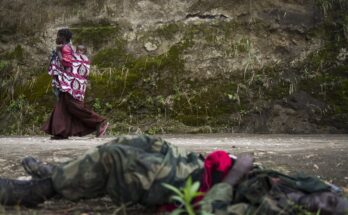Zimbabwe’s ongoing crisis descended into outright chaos on Sunday after president Robert Mugabe failed to announce his resignation as widely expected in a national address on live television.
Instead, in a rambling 30 minute address, Mugabe offered no concessions to his critics, the tens of thousands who marched calling for his resignation or the army commanders who led the military takeover last week.
Instead, the 93-year-old autocrat said that “we cannot be guided by bitterness or revengefulness which would not makes us any better … Zimbabweans” and said that he would preside over a special congress of the ruling Zanu-PF party scheduled for next month – suggesting he has no immediate intention of stepping down.
Mugabe, who repeatedly cited the legacy of Zimbabwe’s brutal liberations wars of the 1970s, said he believed that the military “operation” launched last Tuesday by army commanders was motivated by “a deep patriotic concern for the stability of the nation” and “did not amount to a threat to our well-cherished constitutional order”
“I am aware that many developments have occurred in the party, given the failings of the past, and anger they might have triggered in some quarters …. [but] I am confident that from tonight our whole nation will put shoulder to the wheel.” Mugabe said.
Earlier in the day, the veteran leader, who has been in power for 37 years, was sacked as leader of the Zanu-PF and told by 200 of the party’s top officials gathered at an extraordinary meeting in Harare to resign as head of state or face impeachment when parliament reconvenes on Tuesday.
Emmerson Mnangagwa, the vice-president whose sacking 13 days ago led to the military takeover, was appointed interim leader of the party.
Mnangagwa is widely expected to take over from Mugabe as president.
The moves by Zanu-PF follows huge demonstrations in cities across the country on Saturday demanding Mugabe leave power. His refusal to go plunges the country into deep uncertainty.
The leader of Zimbabwe’s influential war veterans said plans for impeachment would go ahead as scheduled.
Chris Mutsvangwa, who has been leading a campaign to oust Mugabe, told Reuters in a text message moments after Mugabe finished his speech that people would take to the streets of Harare on Wednesday.
Mugabe has argued that the military takeover is an illegal coup and appears to be hoping that this will trigger regional intervention, sources familiar with his negotiations with the military said.
Observers say Mugabe may hope to oblige the military to depose him by force, which could theoretically trigger an intervention by regional powers.
The South African Development Community (SADC), headed by South Africa, is to meet in Angola on Tuesday to discuss the situation.
Last week the SADC called for a “constitutional” solution to the crisis, which was understood by some to be a call for the military to allow Mugabe to serve out his current electoral mandate as president.
According to sources close to the military, the president, who has been kept under house arrest in his sprawling residence in Harare, wants to be allowed to remain in power until elections scheduled for next summer are held.
The military has said it has no intention of taking permanent control of government but has indicated it does not want to leave Mugabe in office.
An array of senior commanders sat beside Mugabe as he made his speech. General Constantino Chiwenga, the general who led the takeover, turned the president’s pages as he speak. Many looked stunned when Mugabe finished his speech saying “Thank you, good night”.
A microphone caught later muffled comments from the elderly leader referring to either a “long” or a “wrong” speech, leading to speculation that Mugabe may have deliberately or otherwise omitted pages or read content that varied substantially from that reportedly cleared with the military high command.
Zimbabweans who gathered at a bar in the capital to celebrate Mugabe’s expected announcement of his resignation said they were frustrated.
One named Nyasha said: “I would be happy for him despite everything he has done to leave with dignity and just walk away. … He is so stubborn.”
Earlier in the day Zanu-PF delegates had broken into cheers, song and dance when the motion was passed, removing Mugabe as the head of the party and appointing Mnangagwa to replace him.
The 200 or so members of the central committee leapt to their feet, many singing Mnangagwa’s name.
“This is the day that is defining the new birth and development of our country,” said Mike Madiro, chairman of one of the provincial party branches that had formally set Mugabe’s dethroning in motion.
Zanu-PF also expelled Grace Mugabe, the divisive first lady, and 20 of her closest associates.
The military commanders claim last week’s takeover was necessary to remove “criminals” close to the president, a reference to Grace Mugabe and her “G40” faction.
The purge has in effect decimated the group and underlines the degree to which the overthrow of Mugabe’s 37-year rule has been driven more by competition for power within the Zanu-PF than popular anger at a dictatorial and corrupt regime.
Mugabe made some references to internal divisions in his speech, saying: “The way forward cannot be based on vying cliques that ride roughshod over rules and procedures.”
“The party constitution must apply in all situations and to all members … victimisation and arbitrary decisions must be put behind,” he said.
“The party must have older players and newer entrants through a well defined sense of hierarchy. These matters will be discussed at forthcoming congress. I will preside over the congress processes.”
Grace Mugabe, 52, has not been seen since the takeover. Sources told the Guardian she was in her husband’s Harare residence when he was detained on Tuesday and had not moved since.
Since taking power, the military has arrested about a dozen senior officials and ministers. Several remain detained. Two senior politicians close to the first lady are believed to have taken refuge with their families in the president’s residence on the night of the military takeover.
Few options are now open to Mugabe, who ruled Zimbabwe through a mixture of coercion, bribery and revolutionary rhetoric, beyond playing for time. Support in some branches of the security establishment – such as the police – has evaporated.
Army commanders have long had good relations with Mnangagwa, a former intelligence chief and veteran Zanu-PF official who was responsible for the repression of opposition parties in successive elections between 2000 and 2008.
Opposition leaders in Zimbabwe have called for the formation of an inclusive transitional government but risk being sidelined by the powerful army and Zanu-PF.
There are also concerns that the military will maintain significant influence in the future.
“The ruling party have allowed the military to taste political power [and] … We have to expect some role of the armed forces to continue for some time,” said Martin Rupiya, a former Zimbabwean army general.
Knox Chitiyo, of London’s Chatham House, said it was a “momentous time”.
“There is no question that there is a huge element of faction score settling in this but that has inadvertently triggered a military-guided popular revolt. The military are being held up as the liberators of the country. But it remains to be seen how long that will be the case,” Chitiyo said.


